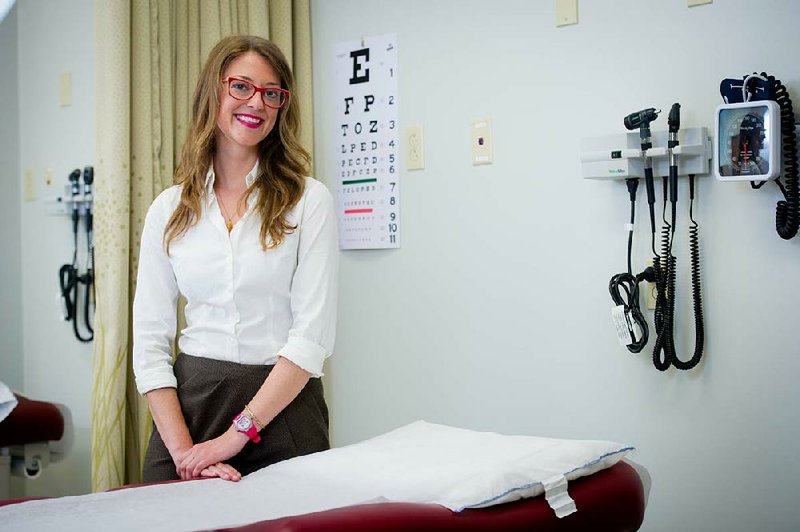As a registered nurse who works 12-hour shifts for three straight days, Ashley Creek didn’t always feel like hitting the books to earn a bachelor’s degree in nursing - even though “hitting the books” actually involved powering up her laptop.
“A lot of times, I just had to do it,” said Creek, 32, who lives in Fayetteville. “It didn’t matter how I felt.”
There was an upside that made it easier to finish the remaining 29 credit hours toward her degree from the University of Arkansas at Fayetteville in just under a year.
“I didn’t have to get up, get ready, drive someplace and find a parking place,” she said. “There were plenty of times that I would sit at my kitchen table and do homework in my pajamas.”
Creek is among four students who completed the university’s new, online degree-completer program in nursing within the first year of its debut. She began in mid-August 2012 and by early August this year, she’d finished her studies for a bachelor’s degree.
The program is designed to allow registered nurses to complete previous work toward a bachelor’s of science in nursing.
Registered nurses who already have associate degrees in nursing can take the program, as can those who’ve earned nursing diplomas, which are akin to certificates, said Holly VanWinkle, clinical instructor of nursing for UA’s Eleanor Mann School of Nursing.
The other three students who completed the program with Creek were Jennifer Breathitt of Fayetteville, Paula Eaton of Jonesboro, and Lizabeth “Liz” Phillips of Bella Vista.
According to the description on the UA website, the degree-completer program can be finished in a year, but three- and five-semester plans are available. Its courses are taught by full-time faculty members. No campus visit is required because the program is fully online. Other features include nine hours of graduate credit toward a master of science degree in nursing and the requirement of “only one clinical immersion course tobe completed in student’s geographic area.”
About 50 students are currently enrolled in the program. Plans are to continue expanding the bachelor’s in nursing program by admitting 70 students when the spring 2014 semester starts in January.
PUSH FOR NURSES
On the first day of fall classes, UA debuted another online course for a doctorate in nursing, VanWinkle noted. Thirty students signed up for the program, called “doctor of nursing practice,” which prepares advance-practice nurses who want to focus on clinical settings.
The new courses reflect a blend of trends in Arkansas and the rest of the country, including a national push for more nurses and more highly educated nurses, as well as the use of the online platform to increase college degree-holders in general.
“Provisions in the Affordable Care Act will base provider reimbursements on patient outcomes, driving more healthcare providers to seek better-educated nurses with experience in research and evidence-based practice,” Pegge Bell, the Mann School’s director, said in a statement when the university marked the bachelor’s program’s one-year mark in August. The school is housed within UA’s College of Education and Health Professions.
A report released Oct. 5 by the Institute of Medicine recommended - despite widespread claims of a national nursing shortage generally - that the nursing profession institute residency training similar to doctors’ training, increase the number of nurses who hold bachelor’s degrees by 80 percent by 2020, and double the number who pursue doctorates.
“Nursing is unique among the health professions in the United States in that it has multiple educational pathways leading to an entry-level license to practice,” the report says.
For more than four decades, education levels for nurses have been debated, the report continues, and meanwhile the “competencies needed to practice have expanded, especially in the domains of community and public health, geriatrics, leadership, health policy, system improvement and change, research and evidence-based practice, and teamwork and collaboration.”
“Nurses are being called upon to fill primary-care roles and to help patients manage chronic illnesses,” the report says. “In hospitals, nurses must make critical decisions associated with care for sicker, frailer patients and work with sophisticated, life-saving technology.”
The Institute of Medicine is one of four arms of the Washington-based private, nonprofit policy group known as the National Academies. It contends that the nation’s 3 million nurses as a whole, compared with other health-care professions, spend the most time caring for patients, and that “regulatory and institutional” obstacles limiting their scope of practice should be removed so patients can fully benefit from their skills, knowledge and training.
“Nurses therefore have valuable insights and unique abilities to contribute as partners with other health-care professionals in improving the quality and safety of care as envisioned by the Affordable Care Act,” according to the institute committee that wrote the report.
ONLINE OFFERINGS
The UA campus’s portal for all its online offerings, which includes information for the new online nursing programs and some older ones, is at online. uark.edu/nurse/, said Kay Best Murphy, spokesman for UA’s Global Campus, where online programs are administered.
The state’s medical school, the University of Arkansas for Medical Sciences, offers similar online nursing programs, according to its website.
Creek described the UA online bachelor’s program as anything but passive. She juggled the coursework and her job at Washington Regional Medical Center in Fayetteville.
“There really isn’t a lot of lecture,” she said. “A lot of it is interactive, like read these five articles, and then participate in this discussion.”
She doesn’t think she could have finished her bachelor’s degree so quickly without the online program.
“It’s hard to imagine going to work and then sitting in a class on campus from, like, 1:30 to 3:30,” Creek said.
“It probably would have taken me years, if I would have had to take classes actually in the classroom,” she said. “I probably would have taken one a semester or something.”
Arkansas, Pages 9 on 10/14/2013
